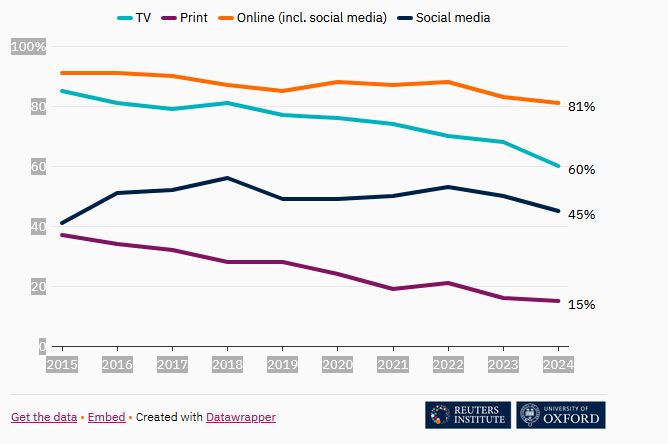Trust in news media in the Czech Republic remains low at 31% of the population. This is comparable to the figure a year ago (30%). The data comes from the new wave of the Digital News Report 2024 study by the Reuters Institute. According to the report, the overall level of trust is a reflection of the country's economic uncertainty and political polarization.
However, the report says that for some media outlets, trust has increased by as much as 4-5 percentage points. Of the media outlets surveyed, respondents again identified Czech Radio (trusted by 62%) and Czech Television (trusted by 59%) as the news outlets with the highest trust, followed by Hospodářské noviny (58%), Seznam Zpravy (57%) and CNN Prima News (56%). However, not all news outlets are included in the survey, so this is not a complete list of media outlets by their trustworthiness.
According to the study, news viewing is generally declining in the Czech Republic. People get their news most often from the internet (81%), followed by TV news (60%), social media (45%) and print (15%). However, all of these channels declined in news viewership.
According to the research, the share of people paying for news in the Czech Republic has remained unchanged over the year at 13% (14% last year).
Source of news coverage (2015-2024) in the Czech Republic
 Source: Digital News Report 2024
Source: Digital News Report 2024TikTok has overtaken Network X in news consumption
In many countries around the world, research has recorded a further decline in the use of Facebook for news (37% globally) and an increase in other sources including messaging apps and video networks, according to a recent study by Digital News Report. YouTube is used for news by almost a third (31%) weekly, WhatsApp by around a fifth (21%). TikTok (13%) has overtaken network X (formerly Twitter, 10%) for the first time.
"The public is increasingly relying on competing platforms for information. In turn, many of these platforms are moving away from news and preferring a different type of content. This more complicated ecosystem, coupled with the end of mass recommendations from legacy social networks and increasing attention competition, means that journalists and publishers will have to work much harder to get the public's attention, let alone convince them to pay for news," comments Rasmus Nielsen, director of the Reuters Institute, on this year's results.
Video is growing, new creators are taking over media brands
Video platforms are becoming a more important source of online news, especially for younger audiences. Short news videos are watched weekly by 66% of the global research sample, with longer formats attracting around half (51%). But the main consumption of news video is taking place on online platforms (72%) rather than publishers' websites (22%), raising issues around monetisation.
The research also found that TikTok, Instagram and Snapchat users tend to pay more attention to social media influencers and celebrities than journalists or media companies when it comes to news. This is different from Facebook or Network X, where news from news organizations still attracts the most attention. French news creator Hugo Décrypte, who produces two explainer videos on TikTok and YouTube, exemplifies this trend, and respondents in the survey cited him more often than the established Le Monde or Le Figaro.
Concerns about fake news on networks and AI
Concerns about fake news on the internet have risen by three percentage points over the past year, with around six in ten (59%) users saying they were concerned. This figure is significantly higher in South Africa (81%) and the United States (72%), both of which held elections this year. Uncertainty about whether the news is real is highest on TikTok and X compared to other networks.
Similarly, the public is suspicious of the use of artificial intelligence tools in news reporting. 52% of respondents in the US and 63% of respondents in the UK said they would dislike news generated largely by AI. In contrast, respondents were more supportive of using AI to make journalists' jobs more efficient.
The full study can be viewed in Digital News Report 2024 Final Lo Res Compressed
Source: mediaguru.cz

